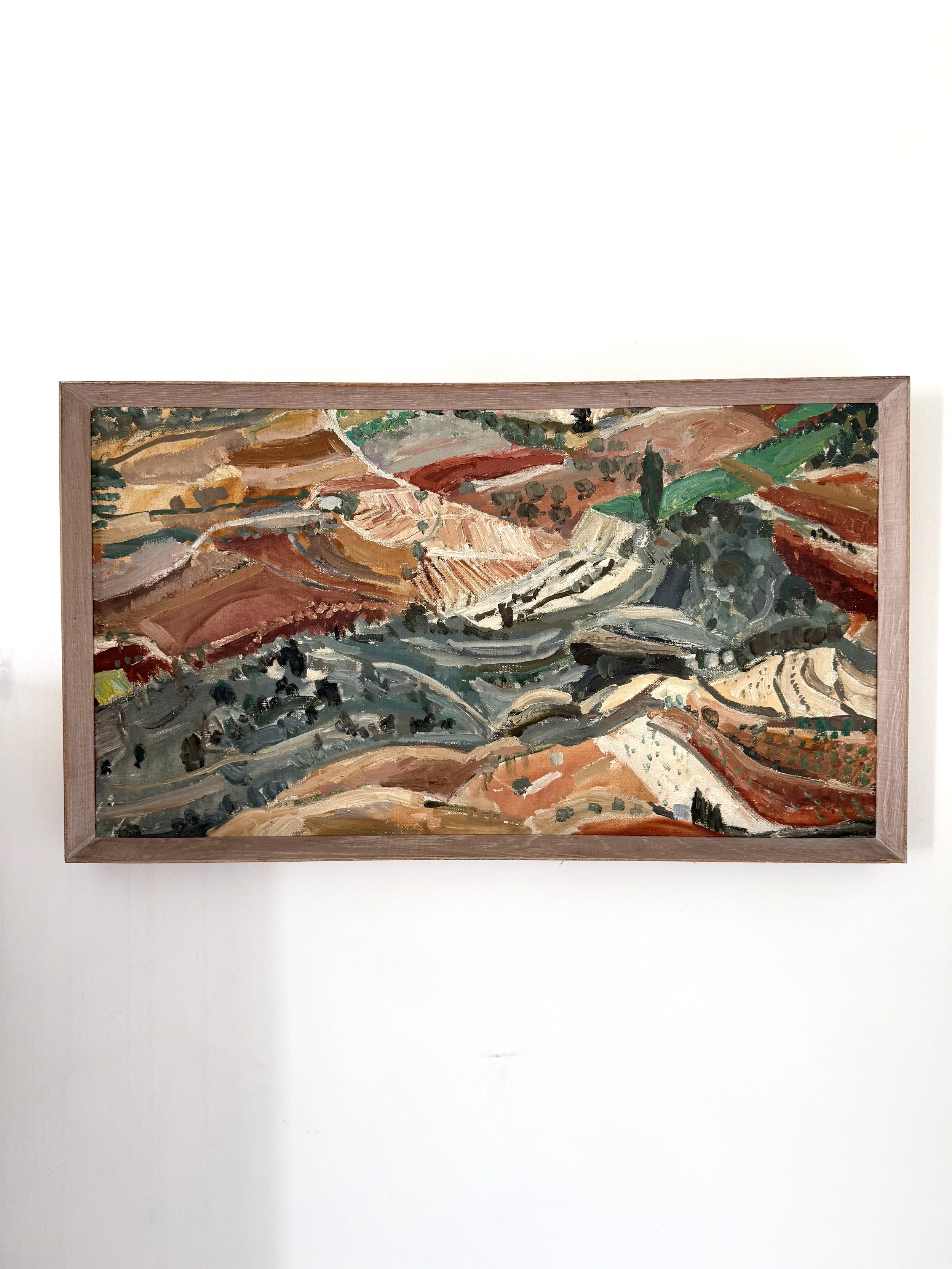 Image 1 of 8
Image 1 of 8

 Image 2 of 8
Image 2 of 8

 Image 3 of 8
Image 3 of 8

 Image 4 of 8
Image 4 of 8

 Image 5 of 8
Image 5 of 8

 Image 6 of 8
Image 6 of 8

 Image 7 of 8
Image 7 of 8

 Image 8 of 8
Image 8 of 8









Landscape of Vallon, France Late 1940s
Sven Blomberg
Late 1940s
Oil on canvas
44.1 × 80.0cm (unframed) 48.0 × 83.8cm (framed)
Signed on the verso
Sven Blomberg (1920-2003) was a Swedish artist who trained at the Slade and Birmingham College of Art. After WWII he exhibited at the Birmingham Art Gallery and was well reviewed by Herbert Reed. Blomberg later had an exhibition at The London Gallery alongside the surrealist painter Roland Penrose, the husband of Lee Miller. Around this time Blomberg moved to Paris where he got to know Giacometti and the philosopher Merleau-Ponty, before eventually settling in southern France.
Blomberg was a close friend of the art critic John Berger, collaborating with him on the hugely influential book Ways of Seeing. Blomberg ‘wrote’ the three visual essays in the book, which consist entirely of images. Ways of Seeing encouraged readers to think about how images, just like words, can be manipulated to create entirely new meanings. Berger wrote of how ‘images of art have become ephemeral, ubiquitous, insubstantial, available, valueless, free. They surround us in the same way as a language surrounds us. They have entered the mainstream of life over which they no longer, in themselves, have power.’
This landscape of Vallon is on a French canvas and in its original frame. The painting likely dates from when Blomberg was living with his family on a farm in Lacoste. Berger used to visit him there and walk the fields, he with his camera and Blomberg with his paintbox.
Towards the end of his life Berger described the experience of sitting beside Blomberg in a hotel room in Paris, looking together at one of his paintings. ‘What we were doing in Room 19, we had done several hundred times before in his studio…looking, intently, critically, silently, at something he had brought back. I say silently but often on these occasions there was music in the air. The colours and lights and darks on the canvas and the traces of the stubby gestures of the brush, gestures which made it unmistakably a painting by Sven, made a kind of music.’
Sven Blomberg
Late 1940s
Oil on canvas
44.1 × 80.0cm (unframed) 48.0 × 83.8cm (framed)
Signed on the verso
Sven Blomberg (1920-2003) was a Swedish artist who trained at the Slade and Birmingham College of Art. After WWII he exhibited at the Birmingham Art Gallery and was well reviewed by Herbert Reed. Blomberg later had an exhibition at The London Gallery alongside the surrealist painter Roland Penrose, the husband of Lee Miller. Around this time Blomberg moved to Paris where he got to know Giacometti and the philosopher Merleau-Ponty, before eventually settling in southern France.
Blomberg was a close friend of the art critic John Berger, collaborating with him on the hugely influential book Ways of Seeing. Blomberg ‘wrote’ the three visual essays in the book, which consist entirely of images. Ways of Seeing encouraged readers to think about how images, just like words, can be manipulated to create entirely new meanings. Berger wrote of how ‘images of art have become ephemeral, ubiquitous, insubstantial, available, valueless, free. They surround us in the same way as a language surrounds us. They have entered the mainstream of life over which they no longer, in themselves, have power.’
This landscape of Vallon is on a French canvas and in its original frame. The painting likely dates from when Blomberg was living with his family on a farm in Lacoste. Berger used to visit him there and walk the fields, he with his camera and Blomberg with his paintbox.
Towards the end of his life Berger described the experience of sitting beside Blomberg in a hotel room in Paris, looking together at one of his paintings. ‘What we were doing in Room 19, we had done several hundred times before in his studio…looking, intently, critically, silently, at something he had brought back. I say silently but often on these occasions there was music in the air. The colours and lights and darks on the canvas and the traces of the stubby gestures of the brush, gestures which made it unmistakably a painting by Sven, made a kind of music.’